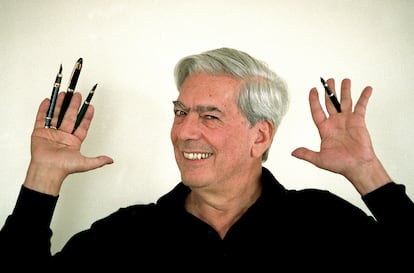Mario Vargas Llosa once said that as a young he dreamed of being a French writer. Well, if I had to summarize today a French reader what Vargas Llosa has meant in our culture, I would say the following: a cross between Gustave Flaubert and Victor Hugo. The obsessive discipline and the extreme formal sophistication (which combined with that of William Faulkner, made the sums and the subtraction his favorite writer); by Victor Hugo, the huge ambition and the overwhelming public presence. The truth, however, is very difficult to take care of the size of this man who has just died in Lima, at 89. Actually, the simplest way to do so, and perhaps the most exact, is to make an elementary reminder: at 26, Vargas Llosa published The city and dogs; at 30, The Green House; at 33, Conversation in the cathedral. This means that, if Vargas Llosa had died with less than 35 years, just after having published the last of those three masterpieces, there would have been no choice but to consider it as one of the best novelists in our language.
The problem – the problem for writers who came after him, of course, the vast majority of whom we seem to his side dwarfs – is that he later published things like Aunt Julia and the writerhow THE WAR OF THE END OF THE WORLD as The goat partynovels that are at the height of the first ones he published, or almost. Moreover, the problem is that, when Vargas Llosa looked like a minor novelist, he was actually a major novelist, especially if he compares it to the other novelists of his time: Lean Mayta’s storyfor example, or Mala girl’s vunosand you will understand what I are talking about. In summary: it is very difficult to find a novelist of our language – or a novelist to dry – who has written a set of novels like the one that Vargas Llosa wrote.
What I just wrote is the essential; Everything else is almost anecdotal. It is a fact that, although first of all it was a novelist, Vargas Llosa was also many other things; Among them, a great literary essayist. It is a facet of his work much less known than others, but the truth is that, except Milan Kundra, no novelist has elaborated in recent decades such a coherent, powerful and persuasive theory about the novel and the work of the novelist; the books about García Márquez, Flaubert or Victor Hugo, or the essays contained in The truth of lies or in the various volumes of Against all odds (even an anecdotal appearance book as Letters to a young novelist) They want to nod that maxim that assures, perhaps unfairly, that in reality the best literary critics are the creators themselves.
For the rest, there is no doubt that, especially in its last years, the public Vargas Llosa – the Vargas Llosa political – darkened to Vargas Llosa Creator, as in its own way it happened to Victor Hugo; It is unfortunate, but also natural: for certain people, it was more satisfactory – and of course easier – abominate Vargas Llosa because I don’t know what more or less unfortunate opinion than reading the almost 700 pages of Conversation in the cathedral, or simply the more than 300 of The call of the tribehis last great political essay, dedicated to examining the work of the thinkers who most influenced him, by Adam Smith to Isaiah Berlin, passing through Ortega and Gasset or Karl Popper. But, if they had read this last book without prejudices, some of their hurried detractors had warned that Vargas Llosa was in many ways much more progressive than so many who call themselves progressive, and above all that it was first and foremost a radical democrat, which is what any Democrat should be. And, if those people had read the work of Vargas Llosa from beginning to end – one of the most rewarding experiences in which a reader of our language can embark – they would have realized that, regardless of the successes and the mistakes he made, as intellectual Vargas Llos virtuous man”, A virtuous man.
I remember to this purpose the last time I saw him, at his home in Madrid, in the company of my friend Héctor Abad Faciolince. We spent the afternoon talking about literature, and at some point Mario showed us a copy of the first edition of Madame Bovaryhis fetish novel, the one that, according to his own confession, made him the writer he was; Towards the end, inevitably, we talk about politics. It was then that Hector asked him a question that I would never have dared to formulate, especially at those heights of his life. “Mario,” Héctor told him, “don’t you think the brutal and unfair criticisms you received from the Latin American left for your departure from Cuba de Castro and communism made you close too much to the right?” Vargas Llosa’s response was a perfect example of his intellectual probity: “It can be,” he said.
But all this in the background are thorough. Few remember today of what was happening in the France of Flaubert and Victor Hugo, much less who ruled her, but we all continue to read Madame Bovary y The miserable ones; Few will remember in the near future of what is happening right now in Latin America or in Spain, much less than those who govern them, but for long years we will continue reading The city and dogs o The Green House. At least in the field of our language, it will take a long time to be born, if it is born, a writer as great as Vargas Llosa: as big and so rich of adventure.

